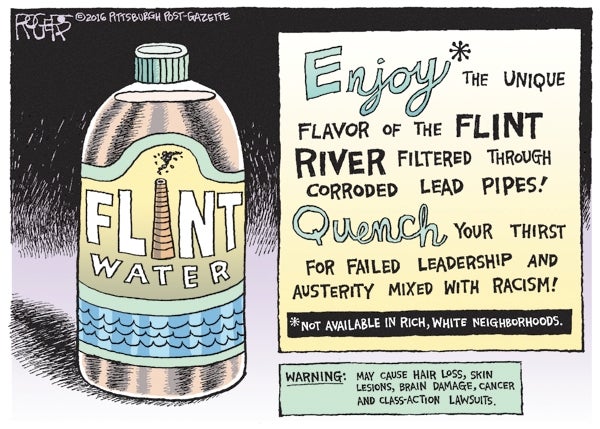Leonard Pitts: Poor hit hard by Flint’s slow-rolling disaster
Published 6:48 pm Wednesday, January 20, 2016
“Them that’s got shall get. Them that’s not shall lose” — Billie Holiday
It was in April of 2014 that the water turned bad. Residents of Flint, Mich., reported that the stuff smelled. It was yellowish brown. You drank it and your hair fell out. Or you developed a rash. Or you were nauseous.
Again, this was in April.
According to a computer search, it was not until the following January that the Detroit Free Press, just an hour down the road, took note. It wasn’t until March that The New York Times began reporting the story. It wasn’t until Jan. 5th of this year — almost two years later — that Michigan Gov. Rick Snyder saw fit to declare a state of emergency and nine days afterward that he asked President Obama to declare the city a disaster area.
And it is not until today that yours truly is writing about it.
There are many points of outrage in the story of Flint’s ill-fated attempt to save money by switching its water supply to the filthy Flint River. You could focus on findings that the river water contained fecal coliform bacteria. Or on the fact that chemicals used to kill said bacteria apparently created new contaminations of their own. Or on reports that much of the problem could have been avoided by adding an anti-corrosive agent to the water for about $100 a day, but the city declined.
You could fix your anger on city officials who continued to insist that the water was safe. Or on state regulators who said the same even after a group of doctors reported finding elevated levels of lead in the blood of Flint’s children. The World Health Organization says lead poisoning in kids can lead to brain damage, shortened attention span, antisocial behavior, hypertension, and damage to the reproductive organs. The effects are irreversible.
So yes, this slow-rolling disaster offers many causes for anger. But one of them is the very fact that it has been a slow-rolling disaster.
It is inconceivable that it would take so long for public officials to respond or media to notice if the water became unsafe in New York, Miami, Charlotte, Chicago, Atlanta or L.A. But Flint is none of those places. Rather, it is a hard-luck, hardscrabble, post-industrial wasteland, a shrinking town of 100,000 people, with a poverty rate of 41 percent and per capita income of less than $15,000. It doesn’t even have a grocery store.
In 2005, when New Orleans drowned, some of us seemed surprised that there were Americans too desperately poor to escape the path of a monster storm. There followed much media hand-wringing over the failure to report so fundamental a story as the continued existence of poverty.
Yet here we are over a decade later, and once again it takes a calamity to make poor people visible. We saw the same pattern in Ferguson, Mo., where it wasn’t until a teenager died and weeks of urban unrest followed that we learned how that city was pimping its poor.
One is reminded of what happens when there’s a blackout: Windows are broken and merchandise taken. No one is surprised by this. Under cover of darkness, people are seldom their best selves. Under cover of darkness, terrible deeds are often done.
News media have left the poor under cover of darkness. Our light shines on politics, the middle class, technological gimmickry and celebrity gossip, yes. But on those the Bible calls “the least of these”? Not so much. Our inattention frees politicians to ignore them. All of a sudden you look up and it’s been almost two years since 100,000 people had safe water to drink and we’re just beginning to notice.
That’s unconscionable. News media’s mission, it is often said, is to afflict the comfortable and comfort the afflicted. Where the plight of the nation’s poor is concerned, we seem to have failed on both counts.
Pitts is a columnist for The Miami Herald.


